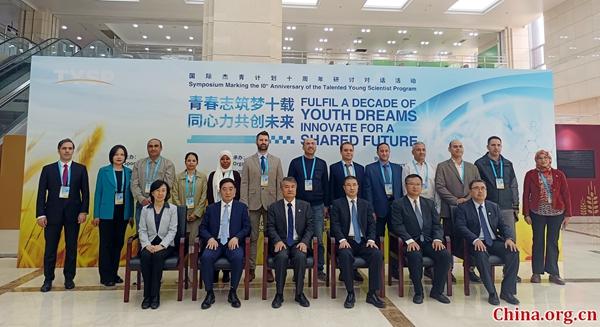Young scientist program fosters talent in developing countries
- By Xu Xiaoxuan
 0 Comment(s)
0 Comment(s) Print
Print E-mail China.org.cn, November 1, 2023
E-mail China.org.cn, November 1, 2023

Chinese speakers and representative scientists from the Talented Young Scientist Program (TYSP) gather for a group photo during a symposium marking the 10th anniversary of TYSP in Beijing, Oct. 31, 2023. [Photo by Xu Xiaoxuan/China.org.cn]
"The program serves as a vital conduit to foster people-to-people exchanges within the science and technology community. International participants can immerse themselves in the vitality of China's sci-tech innovation, integrate themselves into the country's open and inclusive scientific research environment, and become friendly envoys for deepening Sino-foreign cooperation in sci-tech innovation," remarked Zhang Guangjun, vice minister of science and technology, at a symposium marking the 10th anniversary of the Talented Young Scientist Program (TYSP).
Launched by the Ministry of Science and Technology in 2013, TYSP extends sponsorship for talented scientists, scholars, and researchers aged 45 or under from other developing countries to work in China on a full-time basis for six or 12 months. The initiative seeks to foster sci-tech community exchanges between China and other developing countries, collaboratively nurture future leading scientists, and bolster long-term cooperation among research institutes, universities, and enterprises from both sides.
Advancing scientific and technological innovation was included as one of the eight major steps that will be taken by China to support high-quality Belt and Road cooperation at the third Belt and Road Forum for International Cooperation.
Zhang emphasized China's readiness to further enhance scientific exchanges with all parties, especially among the youth, aiming to build a broader cooperation platform and foster a conducive collaboration environment for young science and technology practitioners.
Yasser Refaat, Egyptian deputy minister of higher education for scientific research affairs, lauded the TYSP for providing young scientists from developing countries with a valuable opportunity to delve into their scientific endeavors alongside their Chinese peers, and ultimately contribute to scientific and technological progress in their own countries. He shared that as of 2022, over 200 Egyptian scientists had secured funding to visit and work in Chinese institutions.
Daan du Toit, deputy director general of the Department of Science and Technology of South Africa, noted that science progresses when there's a shared pool of experience, expertise, and resources. He said that TYSP aids young scientists in forming a community of friends and partners, enabling a better response to common challenges confronting humanity, such as food security, energy security, and public health.
During the symposium, representative scientists under TYSP, along with institutions sending and receiving scientists, shared their experiences and suggestions regarding the program.
As of August 2023, TYSP has attracted over 700 young scientists from more than 40 countries to work and study in over 20 provincial-level regions in China.






Go to Forum >>0 Comment(s)